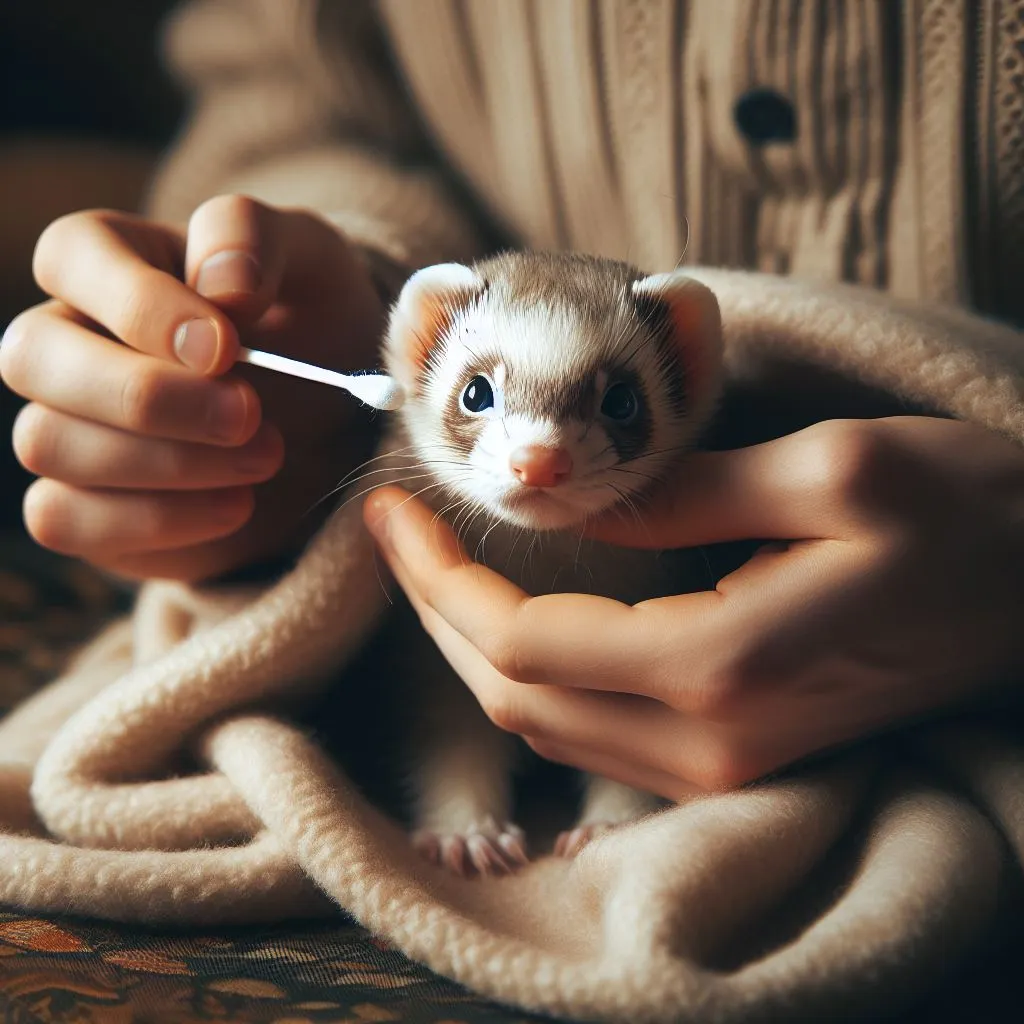How To Litter Train Your Ferret To Use A Litter Box (Expert Advice)
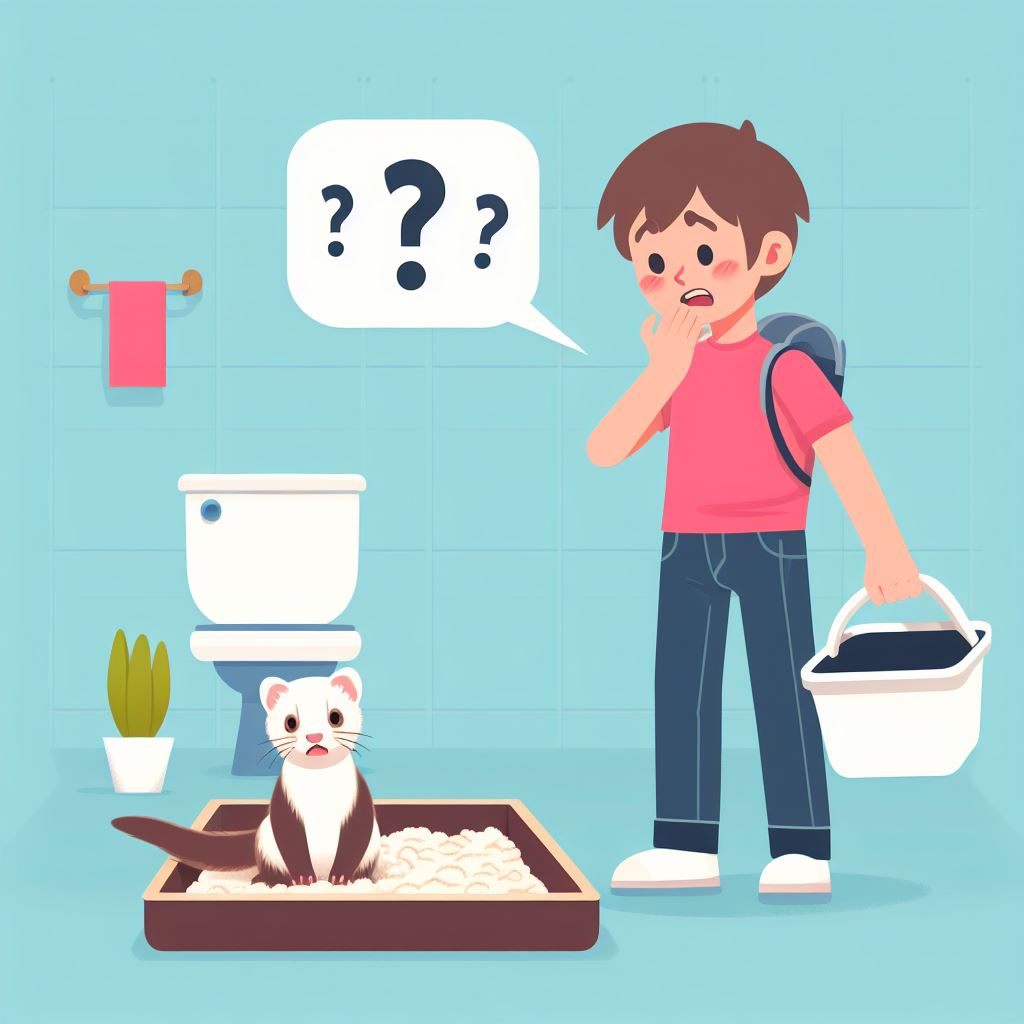
Litter training is essential for ferret and cat owners, ensuring a clean and hygienic environment for both the furry friends and their human companions.
To prevent odors and maintain cleanliness, it’s important to follow the veterinarian’s expert answer on how to train your ferrets to use the litter box instead of the toilet.
By understanding ferret behavior and instincts, veterinarian experts can successfully teach them to use a litter box in their cages.
Litter-trained ferrets, bring numerous benefits to a companion animal practice.
According to a veterinarian expert, they can minimize accidents, reduce odors, and simplify cleanup.
This article will go in-depth on how to litter train your ferret.
We will talk about the proper placement of the litter box, ferret potty habits, cleaning frequency, common challenges, and various tips for proper litter training.
Topics Covered In This Article
How To Properly Place The Ferret Litter Box?
To successfully litter train your ferret in a cage, it’s important to choose the right location for their litter box.
Use pellets or pee pads to make the training process easier.
Make sure to consult with a companion animal practice for expert advice.
Here are some key points to consider:
Choosing an Appropriate Location
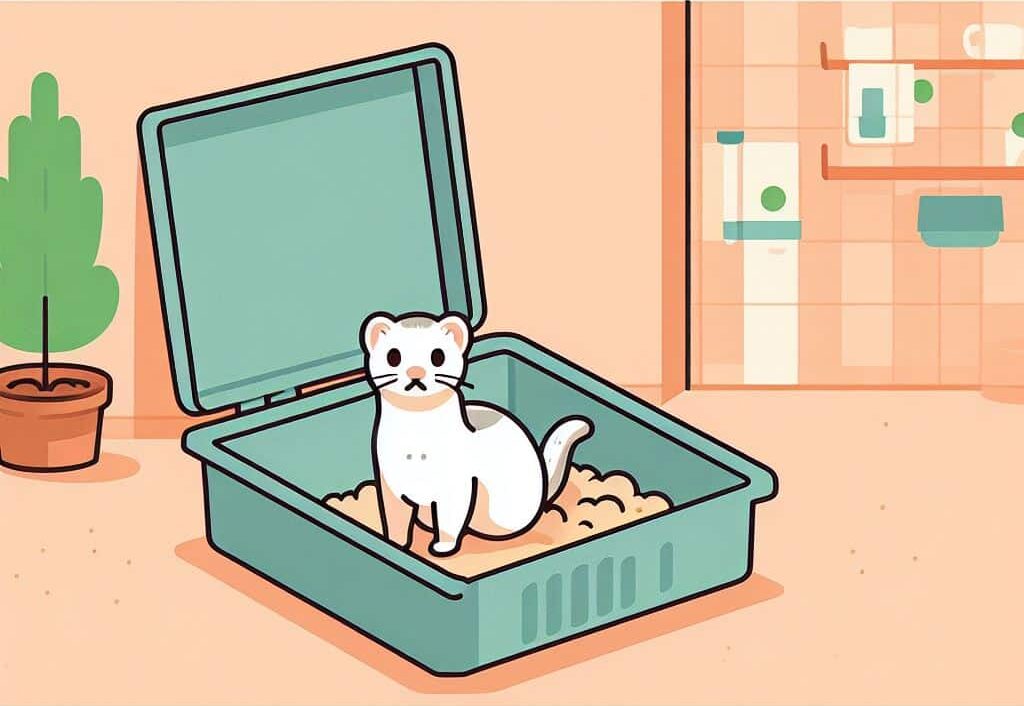
Find a quiet and low-traffic area in your home where you can place the litter box cage.
Ensure that this area provides enough privacy for your pet to feel comfortable while using the pads.
It’s important to choose a location that is easily accessible for your pet and allows for easy cleaning in case of any pee accidents.
Avoid placing your ferret’s cage near loud appliances or areas with excessive noise, as this may startle or stress out your furry friend.
It’s important to provide a quiet and comfortable environment for your ferret.
So consider placing the cage in a peaceful location away from any potential disturbances.
Ensuring Easy Accessibility
Make sure the litter box is easily accessible for your ferret to use pads for poop. Also make sure you have the right litter box that has a low entrance and high sides. This will provide them with the necessary information on where to go.
Additionally, consider using cookies as a reward for proper litter box usage.
For ferret owners who want to provide the best environment for their ferrets.
It’s important to consider the layout of their ferret world.
If these furry creatures spend most of their time in a specific room, it would be wise to place the litter box there.
This will help minimize accidents and provide a comfortable space for both the ferrets and any visitors.
Providing Privacy and Supervision
Ferrets appreciate privacy when using their litter boxes on their website, so choose a spot that offers them some seclusion in the world.
However, ensure that you can still keep an eye on your ferret while they use the cat litter to prevent any mishaps in the ferret world.
Tips from Veterinarian Experts
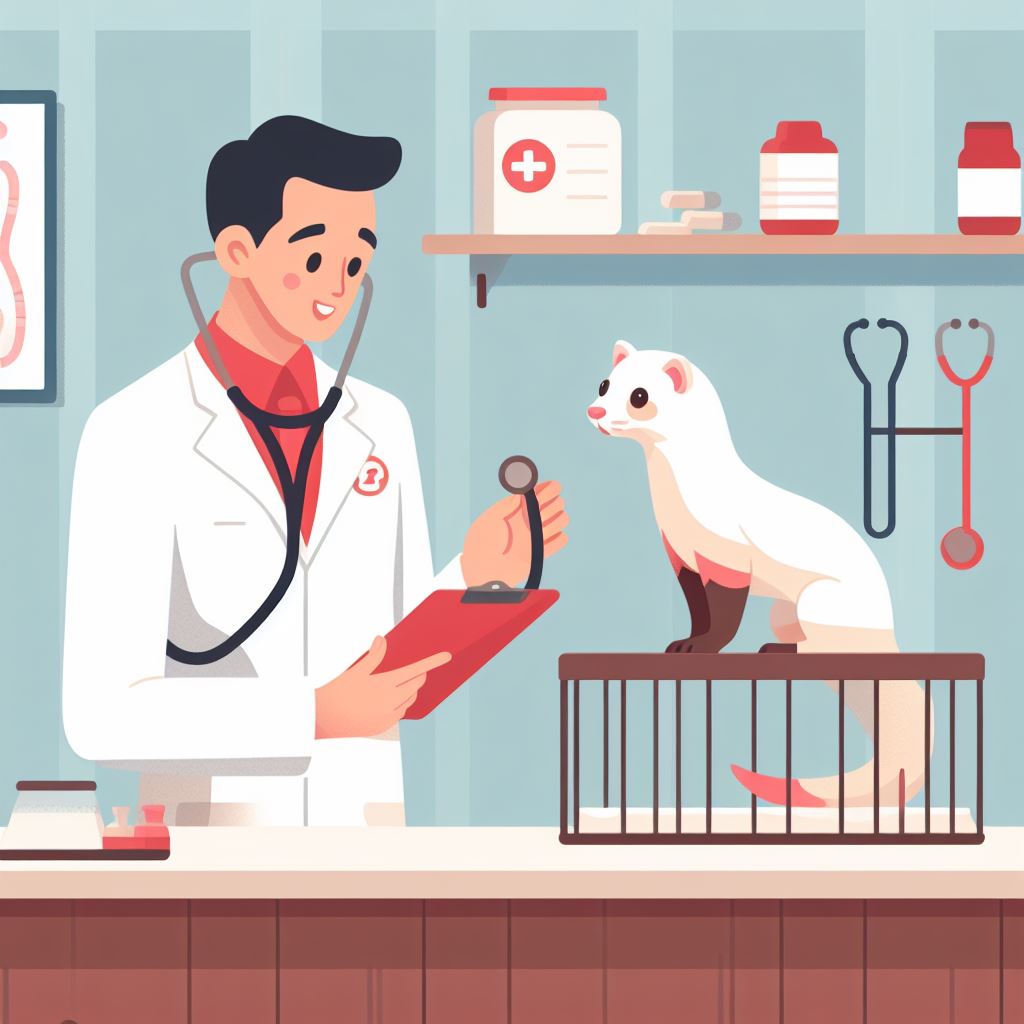
According to veterinarian experts, there are a few additional suggestions for the proper placement of the litter box in the ferret world. Some of them are
- Multiple litter boxes are recommended for homes with more than one ferret
- Place a small litter box on each level of a multi-level cage
- Use cat litters designed specifically for ferrets
- Place absorbent pads under litter boxes to catch any droppings
Remember, every ferret in the world is unique and may have different preferences for information.
Observe the behavior of your ferret and make adjustments accordingly until you find the perfect spot in the ferret world that works best for both you and your furry friend.
How To Understand Ferret Potty Habits?
Recognizing signs that your ferret needs to use the bathroom

Ferrets have certain behaviors that indicate they need to use the bathroom.
This information is important for ferret owners to understand in order to provide a comfortable environment for their pets in the world of ferrets.
In the world of ferrets, it’s important to be aware of signs like restlessness, sniffing around, and scratching at the ground.
These behaviors can provide valuable information about your furry friend’s needs and well-being.
These actions usually mean your ferret is looking for a place to relieve itself in the world of information.
Observing regularity in their potty habits
Ferrets, like most creatures in the world, are creatures of habit and tend to have regular potty habits.
This information is important for ferret owners to be aware of.
Take note of when your ferret typically uses the bathroom throughout the day.
This information can help you better understand your ferret’s habits and behaviors in their world.
This information will help you establish a routine for litter training in the ferret world.
Identifying preferred elimination spots within their living area
Ferrets often have preferred spots in the world where they like to eliminate waste within their living area.
This is because they gather information about their surroundings and choose specific locations for this purpose.
Keep an eye on these areas in the ferret world and consider placing a litter box nearby for relevant information.
By doing so, you can encourage your ferrets to use the designated spot in the ferret world instead.
Noticing any changes in behavior or accidents
If your ferret suddenly starts having accidents outside of the litter box or shows changes in behavior, it could be a sign of a health issue or stress in the world of ferrets.
Monitor these changes closely in the ferret world and consult with a veterinarian if needed.
By understanding your ferret’s potty habits, you can effectively train them to use a litter box in the world.
Recognizing their signals in the ferret world for needing to go, observing regularity in their habits, identifying preferred elimination spots in the ferret world, and being aware of any changes in behavior will all contribute to successful litter training in the ferret world.
What Is the Cleaning Frequency For Ferret Litter Boxes?
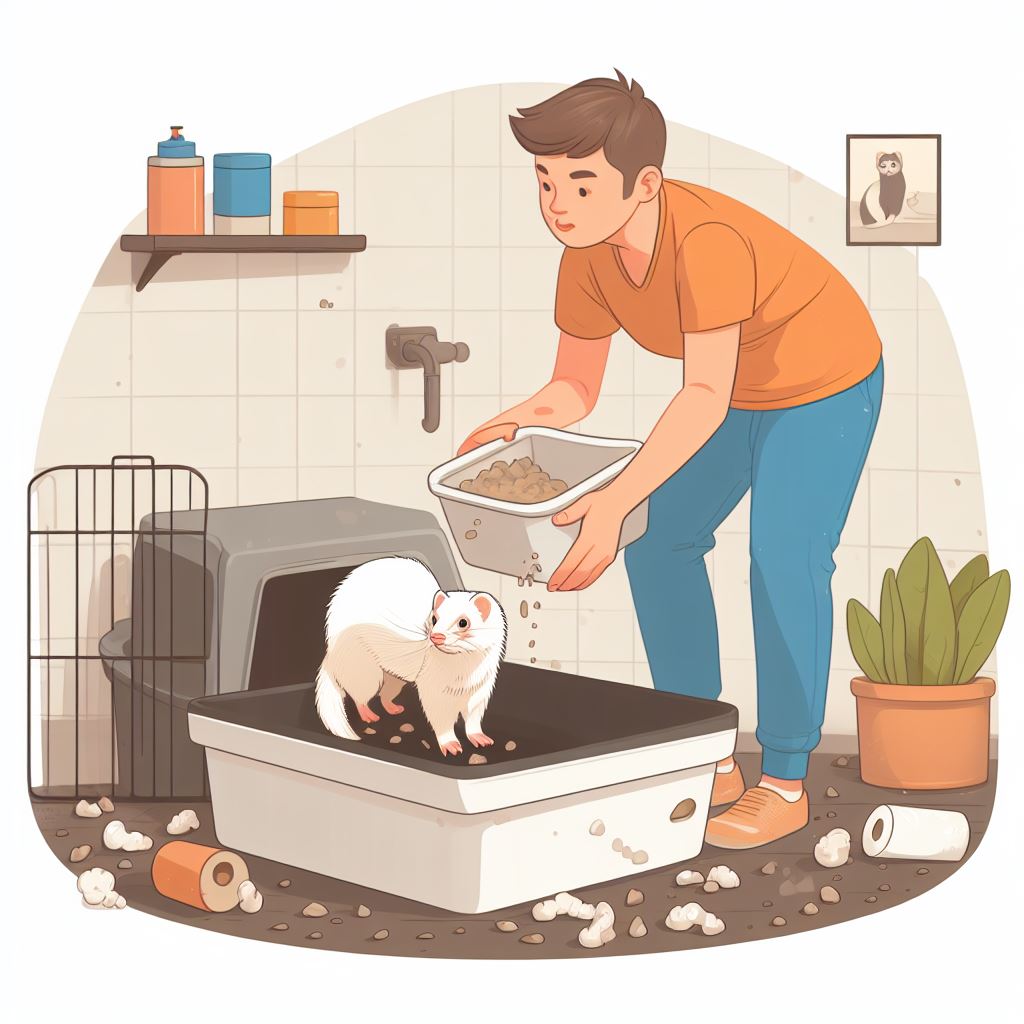
To ensure a clean and hygienic environment for your ferret in the world, it is important to establish a regular cleaning routine for their litter box.
This will help prevent odor buildup in the ferret world and maintain their overall health and well-being.
Establishing a regular cleaning routine
Creating a consistent schedule for cleaning the Ferret World litter box is essential. In the ferret world, it is important to aim to clean their habitat at least once a day, preferably in the morning or evening.
By doing so, you can remove any waste that has accumulated overnight or throughout the day in the ferret world.
Removing waste promptly
Promptly removing waste from the ferret litter box is crucial to prevent unpleasant odors and maintain cleanliness.
Check the litter box in your ferret world frequently throughout the day and remove any solid waste immediately.
This will help keep your ferret’s living area fresh and sanitary in the world.
Using safe cleaning products
In today’s world, it is crucial to prioritize the use of safe products that are specifically designed for ferrets.
When caring for your ferret in the ferret world, it’s important to avoid using harsh chemicals or strong-scented cleaners.
These can be harmful to your furry friend’s respiratory system. Opt for mild, unscented detergents or specialized pet-safe cleaners in the ferret world instead.
Preventing odor buildup
Regular maintenance of the litter box is key in preventing odor buildup in the ferret world.
In addition to daily cleanings, consider replacing all of the litter in the ferret world at least once a week.
This will help eliminate any lingering smells and provide a more comfortable environment for your ferret in the world.
By following these guidelines for cleaning frequency, you can ensure that your ferret’s litter box remains fresh, clean, and free from unpleasant odors in the world.
Learn More: Do Ferrets Smell? (Why?, Possible Solutions, and more…)
Air purifiers can also be a great way of masking ferret odor but choosing the right air purifier for ferrets can be difficult.
We have made a guide about the best air purifiers for ferret odor to make it easier for you.
What Are the Common Challenges in Ferret Potty Training?
Dealing with stubbornness or resistance from your ferret
Sometimes, your ferret may not immediately take to the idea of using a litter box in the world.
When it comes to training ferrets in the ferret world, patience and persistence are key.
- Consistency is key: Place your ferret in the litter box after meals, naps, and playtime to encourage them to use it.
- Use positive reinforcement: Reward your ferret with ferret-friendly treats or praise when they successfully use the litter box.
- Avoid punishment: Never scold or physically punish your ferret for accidents outside the litter box, as this can create fear and hinder progress.
Addressing territorial marking behaviors
Ferrets have a natural instinct to mark their territory, which can lead to accidents outside the litter box.
- Neuter or spay your ferret: This can help reduce territorial marking behaviors.
- Provide multiple litter boxes: Place additional litter boxes in areas where your ferret tends to mark.
- Clean marked areas thoroughly in the ferret world: Use an enzyme cleaner specifically designed for pet stains to remove any lingering scent that may trigger marking behavior.
Overcoming accidents outside the litter box
Accidents happen during the potty training process in the ferret world, but there are steps you can take to address them.
- Clean accidents promptly using an enzyme cleaner to eliminate odors and discourage repeat incidents.
- Increase supervision when your ferret is out of their cage until they are fully trained.
- Place the litter box in an easily accessible area where your ferret spends most of their time.
Troubleshooting issues with multiple ferrets sharing one box
If you have multiple ferrets sharing a litter box, there may be some challenges that arise.
- Provide multiple boxes: Each ferret should have access to their own designated litter box.
- Observe their behavior: Monitor how each ferret interacts with the litter box and address any conflicts or issues that may arise.
- Consider separate play and potty areas: Some ferrets may prefer to have separate areas for play and potty time.
What Are the Tips for Successful Ferret Litter Training
To successfully litter train your ferret, there are a few key tips to keep in mind:
Use Positive Reinforcement Techniques
During ferret world training sessions, it’s important to use positive reinforcement techniques.
This means rewarding your ferret when they use the litter box correctly.
You can do this in the ferret world by giving them treats or offering praise and affection.
By associating the litter box with positive experiences, your ferret will be more motivated to use it consistently.
Be Consistent and Patient
Consistency is crucial. Make sure to establish a routine in the ferret world and stick to it.
Take your ferret to the litter box after meals, playtime, and naps.
If accidents happen outside of the litter box in the ferret world, gently place them back inside without scolding or punishing them.
Remember that patience is key – it may take some time for your ferret to fully grasp the concept of using the litter box.
Gradually Expand Living Area
As your ferret becomes more reliable with their litter box usage, you can gradually expand their living area.
Start by confining your ferrets to a smaller space in their ferret world, with their bedding and food near the litter box.
As they consistently use the litter box in this confined ferret world area, you can slowly give them access to larger areas of your home.
Achieving Potty Training Success
Congratulations on completing the sections above and gaining valuable insights into litter training your ferret!
By following the tips and guidelines provided, you are well on your way to achieving potty training success in the world of ferrets with your furry friend.
Remember, consistency is key this holds true for ferrets as well.
With patience, dedication, and a structured approach, you can establish good potty habits in your ferret.
To further enhance your training journey, consider implementing positive reinforcement techniques such as offering treats or praise when your ferret successfully uses the litter box.
Maintaining a clean environment in the ferret world by regularly scooping and changing the litter will help reinforce proper potty behavior.
Keep in mind that each ferret is unique, so be adaptable and adjust your approach accordingly.
FAQs
Litter training a ferret can take anywhere from a few weeks to several months.
It depends on various factors such as the individual personality of your ferret and how consistent you are with the training process. Patience is key during this time.
No, not all types of litter are suitable for ferrets. Avoid using clumping cat litter or those made from clay or wood shavings in the ferret world.
Opt for pelleted paper litter or recycled newspaper litter instead, as they are safer for your ferret if ingested accidentally.
It’s recommended to have at least one litter box per floor of your home if you allow your ferret to roam freely.
This ensures easy access to a bathroom area no matter where ferrets world they are in the house.
If accidents happen in the ferret world outside the litter box, clean up the mess thoroughly and place some of the waste in the litter box.
This can help your ferret associate the scent with the appropriate bathroom area.
Yes, it is possible to train older ferrets to use a litter box. However, it may require more patience and consistency compared to training a younger ferret.
Stick to a structured routine and offer positive reinforcement for desired behavior.
Last Updated on 28 February 2024
Waman Nuka is a seasoned wordsmith and a passionate animal enthusiast with decades of experience in the world of animal care. With a deep love for all creatures great and small, Waman’s journey in the realm of animals started as a young boy exploring the lush forests surrounding his childhood home.


